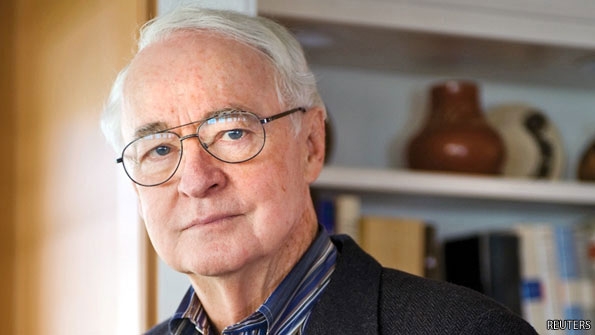
The Penn Program on Regulation celebrates the life and work of scholar James Q. Wilson.
The Penn Program on Regulation offers a special tribute to one of the world’s foremost scholars of bureaucracy and regulatory policy, James Q. Wilson, who passed away earlier this year at the age of 80.
Professor Wilson taught in the Harvard University Department of Government for more than a quarter century, and then spent an additional ten years each on the faculties at the University of California, Los Angeles, and Pepperdine University. The author or editor of numerous books in political science and public policy, he also served as president of the American Political Science Association, was a member of the American Academy of Arts and Sciences, and served on a variety of Presidential commissions on criminal justice and other important policy issues.
“The sad news of Wilson’s passing in March of this year will be a loss felt widely in political science and across the social sciences,” said Cary Coglianese, Director of the Penn Program on Regulation.
In the months since Professor Wilson’s death, many remembrances of his scholarship in the media have emphasized his work on criminal justice policy, with particular mention of his co-authored Atlantic Monthly article on the broken windows theory of crime control – so named because of the title of the Atlantic article.
But Professor Wilson made many other contributions beyond his important advances in criminology. A wide-ranging public intellectual, he was also one of the most influential scholars of organizations and the policy process of the last century, having produced such classic works as Political Organizations (1973), The Politics of Regulation (1980), and Bureaucracy (1989), not to mention the most widely-used college textbook on American Government: Institutions and Policies.
Professor Wilson’s work on regulation and bureaucracy eschewed simple generalizations but nevertheless helpfully illuminated distinct patterns and variations in political interactions. “This is what the best social scientists aspire to achieve,” according to Coglianese.
“Wilson advanced what remains one of the most significant structural explanations for how regulatory policy is shaped by the interaction between government and regulated firms, by both regulation’s beneficiaries as well as by those it burdens,” Coglianese continued.
Although it had been some years since Professor Wilson focused his scholarly attention on regulation and bureaucracy, the Penn Program on Regulation would like commemorate his magisterial impact on the field by featuring a series of tributes and commentaries on The Regulatory Review.
Each essay marks the impact of Professor Wilson and his influential body of scholarship on regulatory policy and institutions. We have invited colleagues, former students, collaborators, and fellow travelers in the field of regulation to offer their own remembrances, personal as well as professional, of James Q. Wilson, the scholar, the teacher, and the man.
, Circuit Judge for the U.S. Court of Appeals for the Second Circuit
“Appreciations of a distinguished academic passing from the scene tend to be confined to professional journals of often narrow specialty, and a few paragraphs on the newspaper obituary page. Such is his impact as a scholar, teacher, and public intellectual, that James Q. Wilson’s death yielded something quite different.”
What Happens in Real Bureaucracies
“I began as a political science graduate student at Harvard in 1980. James Q. Wilson had just finished editing The Politics of Regulation. With characteristic humility and humor, he said the volume was by his ‘wonderful former graduate students,’ adding that I should read it ‘if only to learn about the kind of work done by people unlucky enough to be advised by me.'”
Where Have All the Wilsons Gone?
“It is a sad fact that the tradition Jim Wilson represented in political science – the study of government organizations that took them seriously both as organizations and as parts of the political system – has largely died out in the discipline.”
Bureaucratic Breakdown
“Deep inside James Q. Wilson’s 1989 classic, Bureaucracy, is a nugget with lasting insight. Why, too often, do bureaucracies fail? Wilson explains that different administrators, at different levels of the bureaucracy, have different perspectives, roles, and incentives. Too often, these roles fail to mesh, problems fall through the cracks—and, as a result, programs can fail, sometimes catastrophically.”
Grounded: Not Only in Ideas, But in Reality
“James Q. Wilson was my dissertation adviser at Harvard. When he passed away, the New York Times featured a front-page obituary, and the Wall Street Journal also had a number of articles. One of the articles calls him the most important social scientist of the last century: perhaps hyperbole, perhaps not.”
James Q. Wilson: The (Organization) Man
“Perhaps my perspective was long-ago warped by having twice sat through his legendary bureaucracy course, or by having survived (barely) his graduate seminar, but I persist in seeing Jim as, above all else, a diligent and insightful student of organizations, including all their many flavors, layers, and the multiplicity of influences affecting them.”
James Q. Wilson and Evidence-Based Government
“Among his many interests, perhaps the least well-known is that Jim Wilson was a strong advocate of randomized trials in government. He was most engaged with the idea in relation to policing and justice. More broadly, he thought there was far too little testing and too much flying blind in launching government programs.”
Jim Wilson: From Human Nature to Middle Initials
“I appreciate having this opportunity to pass on a few observations about Jim Wilson, his work, and his teaching. They range from purely personal to strictly academic.”
Drawing Inspiration from James Q. Wilson’s “Bureaucracy”
“Although one of my advisors is, I am not a student of James Q. Wilson in he sense of having had the opportunity to take a class from him…. Yet, it is precisely because of the fact that I have not been a student of Professor Wilson’s that I believe my thoughts can help illustrate the importance of his contribution to the study of government agencies.”



